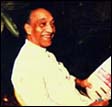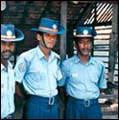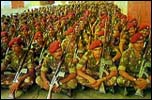The Rediff Special/J N Dixit
'The LTTE supremo wanted his outfit to be acknowledged by Delhi as the sole representative organisation of Sri Lankan Tamils.'
 I kept receiving messages from Joint Secretary Kuldip Sahdev that
I must persuade Jayewardene to devolve some substantive powers
to the proposed interim provincial council and that I should discuss
the composition of the interim governing council with Prabhakaran.
Ultimately, Delhi decided to give me a rap on the knuckles. I
received a call from Foreign Secretary K P S Menon directing me
to proceed to Jaffna immediately for discussions to finalise the
arrangements for the establishment of the interim governing council.
I kept receiving messages from Joint Secretary Kuldip Sahdev that
I must persuade Jayewardene to devolve some substantive powers
to the proposed interim provincial council and that I should discuss
the composition of the interim governing council with Prabhakaran.
Ultimately, Delhi decided to give me a rap on the knuckles. I
received a call from Foreign Secretary K P S Menon directing me
to proceed to Jaffna immediately for discussions to finalise the
arrangements for the establishment of the interim governing council.
These orders were followed by a telephone call from Ronen Sen,
joint secretary in the Prime Minister's office, stating that it
was a direct order from Rajiv Gandhi, which did not leave any
scope to indulge in arguments or defer compliance with. These
orders came to me between September 10 and 17, 1987. I conveyed
a message to IPKF headquarters to the effect that I would reach
Jaffna for discussions with Prabhakaran on all those matters he
was worried about.
The reply I got asked me to reach Jaffna for discussions on September
21. I received another message on September 19, stating that Prabhakaran
himself would not come for the meeting and that I should have
discussions with Balasingham, Yogi and Mahatya. I asked General
Harkirat Singh to convey to Prabhakaran that I would come for
the discussions only if Prabhakaran himself was present and that
his presence at the conference site in the IPKF camp should be
confirmed to me before I took off from Colombo for Jaffna. After
some dithering, Prabhakaran agreed to come himself. These exchanges
delayed the first meeting by two days. I met Prabhakaran thrice
in the second half of September.
I was given advance information by my colleague Kuldip Sahdev
that the agenda for the discussion would be: First, listening
to the concerns Prabhakaran had been articulating after the signing
of the Indo-Sri Lanka Agreement. Secondly, to persuade him to
withdraw public agitations against the IPKF he had been engineering
and to put an end to the fast by Thileepan. Thirdly, to finalise
arrangements for the establishment of the interim governing council.
Fourthly, to indicate to him the powers which would be devolved
to this interim governing council by the Sri Lankan government
immediately. I was also to brief him generally about what further
action Colombo would take to fulfill the provisions of the agreement
for meeting Tamil demands, including the time-frame within which
these process are likely to be completed.
I met Jayewardene on September 21 to find out his views on the
points I was to discuss with Prabhakaran. Jayewardene authorised
me to tell Prabhakaran that he (Prabhakaran) would be appointed
chairman of the interim governing council and chief minister
immediately and that he could continue in the position till
elections were held for the establishment of the permanent provincial
assembly and the board of ministers. He also said that some administrative
and routine law and order powers would be devolved to this interim
governing council. There was the promise of devolving some financial
powers too.
Jayewardene said that other matters of detail Prabhakaran
might raise could be sorted out through mutual discussions. While
he was willing to do his best, Jayewardene said he would not be
able to rush things according to the demands of the LTTE because
he had the much more important task of ensuring that the agreement
did not get nullified by a massive Sinhalese upsurge, which could
not be ruled out.
I landed in Jaffna on the morning of September 23 after getting
confirmation that Prabhakaran had reached the IPKF headquarters.
Before I go into the details of this phase of developments I must
mention that the LTTE had sent me a memorandum ten days earlier,
listing five demands.
 Firstly, that the interim government should
be formed quickly with a clear majority for the LTTE.
Firstly, that the interim government should
be formed quickly with a clear majority for the LTTE.
Secondly,
that nominees of other groups to the interim government should be finalised in consultation with the LTTE.
Thirdly, the police force in the north-eastern provinces would be constituted by the LTTE.
Fourthly, there would be devolution of powers immediately to the interim government on the maintenance of law and order and on all other responsibilities
except foreign affairs, defence, immigration, customs, etc.
Fifthly,
that the Tamil detenues who were given political amnesty should
be released immediately.
At the meeting I had with him, Prabhakaran referred to these issues,
saying he had assurances from Rajiv Gandhi on all of them, which
were yet to be fulfilled. The Sri Lankan army had not been confined
to barracks, neither all over the north or the east. Nor had the
army moved out of schools and colleges, without which the refugees
could not return to their homes.
There were no indications that
the Sri Lankan government would dismantle Sinhalese colonies of
recent origin in Vavunia and portions of Trincomalee from where
the Tamils had been evicted. Prabhakaran wanted Colombo neither
to undertake any rehabilitation work directly nor re-open police
stations till the interim government was fully operational.
Prabhakaran objected to some Tamil groups opposed to the LTTE
being allowed to come back to Jaffna and to the eastern province.
He specifically complained about EPRLF and TELO cadres coming
to Tamil areas, claiming, that these groups were armed by Indian
intelligence agencies and that they had a brief to attack and
reduce the strength of the LTTE. The LTTE supremo wanted his outfit
to be acknowledged by Delhi as the 'sole representative organisation
of Sri Lankan Tamils.'
He felt that India was reluctant to
give this status to the LTTE. It was because of all these reasons
he launched a peaceful agitation to protest against the 'non-implementation'
of the accord. Prabhakaran also expressed his bitterness that
the repeated messages he sent to Madras and Delhi for military
assistance against the Sinhalese army during Lalith Athulathmudali's
Operation Liberation went unheeded.
I told him that the main reason for the delay in the formation
of the interim government of the north-eastern province was that
he had not sent his nominees for this interim governing council
for nearly six weeks from the beginning of August to the middle
of September. He just chose to ignore a message I had sent to
him in this connection sufficiently early. Once he delayed his
nomination the whole process was delayed. All the same, he was
assured that the demands he had articulated would be fulfilled
to the extent possible with full support from Delhi.
At the same
time I cautioned him that the government of Sri Lanka was an equally
reluctant partner in the Indo-Sri Lanka agreement. So, if he gave
the slightest chance to Colombo to claim that India and the LTTE
had not fulfilled their commitments under the Sri Lanka accord,
the agreement would be declared redundant. I requested Prabhakaran
to be realistic about issues like evicting the Sinhalese from
areas they were settled in since the late 1940s and 1950s which was
an impossible task for any government in Sri Lanka.
I, however,
assured him that more recent colonies established in the 1980s and
the proposed Sinhalese colonisation programmes could be stopped
once the interim government took effective control over the north-eastern
province.
As for the additional issues mentioned, I told him that while
India acknowledged the important role of the LTTE in Tamil affairs,
the endeavour should be to create a united Tamil front to implement
the provisions of the Indo-Sri Lanka Agreement. I suggested that
he could try to establish equations with other Tamil political
parties and militant groups to ensure that they participated effectively
in the new provincial government.
Prabhakaran's response was that
while he could work with EROS and TULF, it would be difficult
to develop an equation with organisations like PLOTE, TELO and
EPRLF. When I pointed out that EPRLF had some influence in certain
Tamil areas, specially in the east and that carrying the group
with him would be useful, Prabhakaran was ambiguous in his response.
The discussions held on September 23 were inconclusive. Prabhakaran
first wanted confirmation that Jayewardene would agree to the
creation of an interim governing council with expanded membership
of 12 in which the LTTE would have a guaranteed majority of at
least seven members, with the right to nominate one of the Muslim
representatives and the chief administrator. Prabhakaran also
sought categorical assurances that powers regarding the maintenance
of law and order and for collection of certain categories of taxes
would be handed over to this interim government, with LTTE cadres
begin given a major portion of responsibility for policing the
proposed north-eastern Provinces.
 When I conveyed these demands to Jayewardene, he agreed reluctantly
to delegate his executive powers regarding law and order and policing
to the proposed interim governing council. But he could not devolve
the powers of taxation as extensively as the LTTE desired. Jayewardene
said he would like to have a panel of two or three names selected
by the LTTE from which he would choose the chief administrator
or administrator in council of the north-eastern province pending
the elections of the provincial council for the north-east. He
agreed to let the LTTE have the majority in the proposed interim
governing council. Prabhakaran remained dilatory during the discussions
that followed on September 26.
When I conveyed these demands to Jayewardene, he agreed reluctantly
to delegate his executive powers regarding law and order and policing
to the proposed interim governing council. But he could not devolve
the powers of taxation as extensively as the LTTE desired. Jayewardene
said he would like to have a panel of two or three names selected
by the LTTE from which he would choose the chief administrator
or administrator in council of the north-eastern province pending
the elections of the provincial council for the north-east. He
agreed to let the LTTE have the majority in the proposed interim
governing council. Prabhakaran remained dilatory during the discussions
that followed on September 26.
By this time, the physical condition of the LTTE leader, Thileepan,
at the Nallur Kandaswamy temple had irretrievably deteriorated.
Earlier, had asked me to personally go to the temple
where Thileepan was on fast surrounded by crowds to request him
to break the fast. I told him I was quite willing to do so provided
I had a guarantee that he would yield. But Prabhakaran could give
no such guarantee, as Thileepan was an idealist and committed
freedom fighter.
The IPKF and our intelligence sources had informed me that the plan
was to take me to Thileepan at the Nallur Kandaswamy temple, subject
me to a massive anti-Agreement and anti-Indian demonstration and
then to reject my request with a lot of publicity about the Indian
high commissioner's effort being spurned.
I was clear in my mind that I would not subject the Government
of India to such a humiliation. So I told Prabhakaran that unless
I had an assurance that Thileepan would break the fast I was not
prepared to make a futile effort. It was Thileepan who went on
a fast for which there was no provocation in objective terms.
And it was the LTTE high command's decision to support his fast
in which neither the Government of India nor its people were involved.
Thileepan expired half way through the discussions between
September 23 and 28. It was an unnecessary and avoidable tragedy.
told me that the lute's capacity to support and implement
the Agreement was badly affected by the death of Thileepan, as
he had expressed a wish that LTTE should withdraw from its commitment
to the Agreement. I took the stand that a decision in this regard
rested entirely with Prabhakaran. But if he scuttled the agreement
even before it was given a chance of implementation, he should
not look to India in future to fulfil his aspirations.
In the meetings on September 26 and 28, Prabhakaran said
the readiness of Sri Lanka to meet some of his demands was not
enough. The Government of India should also fulfil certain demands.
The Indian media should stop criticism of the LTTE for not surrendering
all its arms and for organising demonstrations against the IPKF.
The IPKF should leave the maintenance of law and order to LTTE
cadres in Jaffna. That the IPKF should also not interfere with the
demonstrations and relief distribution processes being undertaken
by the LTTE.
 I told Prabhakaran that till the interim government
was formed and took effective charges of these responsibilities,
the IPKF's involvement was an integral part of its peace-keeping
obligations. Prabhakaran was also told that if he kept instigating
civilian disturbances and agitations, he would have only himself
to blame for things not settling down.
I told Prabhakaran that till the interim government
was formed and took effective charges of these responsibilities,
the IPKF's involvement was an integral part of its peace-keeping
obligations. Prabhakaran was also told that if he kept instigating
civilian disturbances and agitations, he would have only himself
to blame for things not settling down.
Disclosing that he had sent a request for some more funds for
the maintenance of his cadres to Delhi, Prabhakaran sought my
intervention to expedite it. He promised to withdraw the agitation
against the IPKF and the local administration after the interim
government came into being. Prabhakaran reluctantly agreed to
abide by the conclusions reached and the agreements arrived at
in the agreed minutes of the discussions held between me
and him from September 26 to 28.
He, however, refused to sign
these agreed minutes himself, arguing that it was a political
document and that he was primarily a military leader. So he would
ask Mahatya to sign this Agreement upon which I told him that my
colleague, First Secretary Hardeep Puri, would sign the agreement
on behalf of the Indian delegation. This was the only document
which Prabhakaran formally authorised for signatures by the LTTE
in relation to the Indo-Sri Lanka Agreement.
Tomorrow: How the hostilities began
Excerpted from Assignment Colombo, by J N Dixit, Konarak Publishers, 1998, Rs 400, with the publisher's permission.
Readers interested in obtaining a copy of the book may direct their enquiries to Mr K P R Nair, Konarak Publishers, A-149, Main Vikas Marg, New Delhi 110 001.
Tell us what you think of this feature
|



